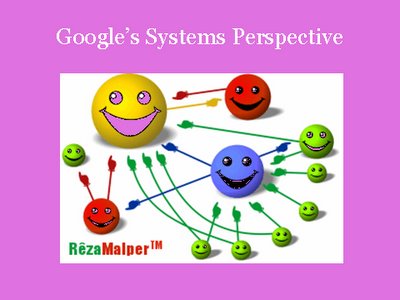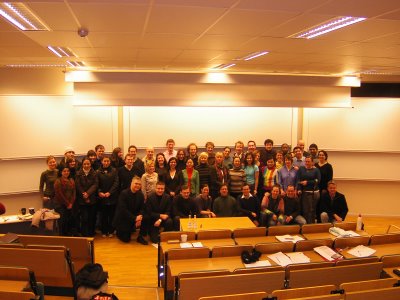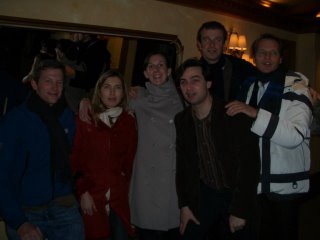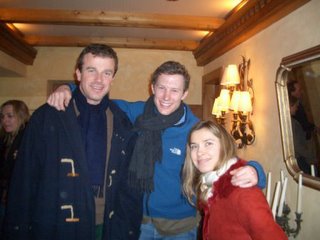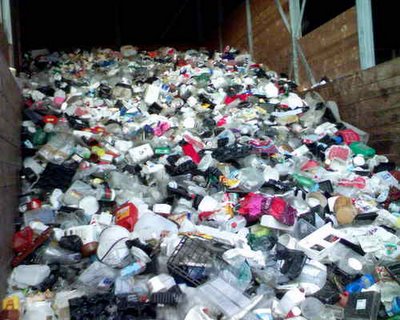http://www.devilducky.com/media/38792/ or
http://www.transbuddha.com/mediaHolder.php?id=1147
Unfortunately, the realness behind that hilarity is just all too real. Another big story on climate change, in case you missed it, hit the papers over the weekend as a NASA scientist spoke out on the administration demanding that any climate change data be screened by them before being released to the public. Clearly, this is very scary stuff when politics are not only interfering and distorting science but actually superseding it.
Washington Post Article on NASA Climate Science
2005 was officially the warmest year on record. Also note in this article how much is spent each year on trying to determine what kind of risks climate change pose ($2 billion) – money better spent on implementing solutions at this point.
In related news, I’m revisiting Limits to Growth – the 30 year update as we start our literature review for the thesis. 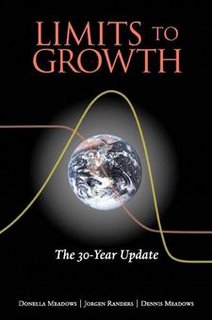
The introduction includes a nice clear explanation of how and why the original text (LTG, 1972) was misinterpreted in some ways and did not prompt the necessary societal and policy reactions that the research showed were vital.
"Not everything bears repetition, but truth does—especially when both denied by entrenched interests and verified by new information."
—Herman E. Daly, former senior economist in the Environment Department of the World Bank and Professor School of Public Affairs University of Maryland
The reason I bring it up is that in systems it’s not so much the limits, or thresholds that are the most important, but the overshoot and consequent collapse that is the issue. Many took a simplistic interpretation of LTG, taking it to mean simply that some day we’ll run out of certain resources, and we need to be ready for that day. But as we know complex systems aren’t that straight forward. The consensus among scientists is now that we have overshot certain limits in the global system in terms of climate change and as we know, we’re already feeling the consequences in the form of storms, terrorism, etc. – which just means that it is that much more important to start acting now to minimize the adverse impacts! Anyway, put LTG on your must read list.
In regards to actions we must take now, below is a quick email exchange with a friend on ethanol, something I’ve been meaning to write about for a while, apologies for the disorganized email style, but it should get the main idea across:
is this the key to the future (ethanol)?
http://money.cnn.com/magazines/fortune/fortune_archive/2006/02/06/8367959/index.htm?cnn=yes
----------------------------------------
thanks for the article, i'll check it out - before even looking at it i can say a couple of important things though:
1) There is no one key to the future - it will take a combination of so many things to reach sustainability - many "new" fuels, better city planning, changes in lifestyle, more efficient technology - the mentality that there is one big thing that will save us has to go.
2) Bio-fuels will, and already are playing a big part in the transition - ethanol has a lot of problems in terms of how much energy you get out of it vs. how much you put in - especially in the states - a lot of technical details behind it that i'm not an expert on, but depends what your raw materials are (sugar cane is among the best - corn, which the US is looking to rely more heavily on, is much less efficient - check out Michelle's post on this for details) - and practices to get that raw material - industrial agriculture in the US requires more embodied energy - used to produce fertilizers, pesticides, run machinery - than you get out at the end of the day - a net loss when you look at the whole system. That's not even counting the all-important (maybe most important) impact on soil through erosion - that is after all the basis of our civilization.
So - yes, ethanol will play a big part and the shift is already starting - still need a lot of work to have it resemble anything sustainable - and as always, gotta keep the whole system perspective to find the true costs. When we start doing it properly on the agriculture side, will be a great way to store solar energy.
Last point - we went to a biofuel conference in Stockholm, talked to the guy from Saab - they have a 'flexi-fuel' vehicle that runs on ethanol mix and/or gas - you can go to an ethonal station, use half a tank and top it off w/ unleaded or visa versa - a great technology for transitioning - and get this.... there are 4.5 MILLION of them on the roads in the US - and most people that drive them don't even know they can do that - point is, no sacrifice in the car / style / performance, and fixes one half of the 'chicken or egg' dilemma changing infrastructure w/out demand or creating demand w/out infrastructure.
Hope you're doing well, my boy.... best – Geo
(As you’ll see in the article, it covers a lot of the issues I touched on in much better detail). Anyway, some random musings, I hope to get a post up on our thesis project soon – we’ll be looking at ways to improve global offset mechanisms, like CDMs under

